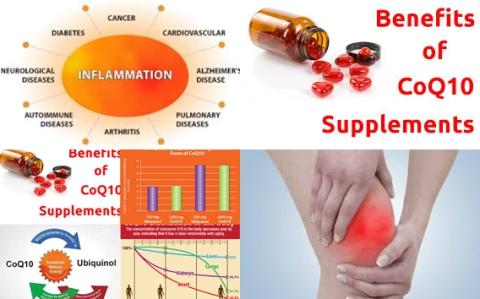
Objectives:
Does coenzyme Q10 (CoQ10) supplementation improve biomarkers of inflammation and oxidative stress among patients with coronary artery disease (CAD)?
Study design:
This review article included 13 RCTs.
Given the presence of heterogeneity, random-effects model or fixed-effect model were used to pool standardized mean differences (SMDs) as summary effect sizes.
Results and conclusions:
The investigators found pooled findings for biomarkers of inflammation and oxidative stress demonstrated that coenzyme Q10 supplementation significantly increased superoxide dismutase (SOD) [SMD = 2.63, 95% CI = 1.17 to 4.09, p 0.001, I2 = 94.5%] and catalase (CAT) levels [SMD = 1.00, 95% CI = 0.57 to 1.43, p 0.001, I2 = 24.5%] among patients with coronary artery disease.
The investigators found pooled findings for biomarkers of inflammation and oxidative stress demonstrated that coenzyme Q10 supplementation significantly reduced malondialdehyde (MDA) [SMD = -4.29, 95% CI = -6.72 to -1.86, p = 0.001, I2 = 97.6%] and diene levels [SMD = -2.40, 95% CI = -3.11 to -1.68, p 0.001, I2 = 72.6%] among patients with coronary artery disease.
The investigators found among patients with coronary artery disease no significant effect of coenzyme Q10 supplementation on:
-C-reactive protein (CRP) [SMD = -0.62, 95% CI = -1.31 to 0.08, p = 0.08, I2 = 87.9%];
-tumor necrosis factor alpha (TNF-α) [SMD = 0.22, 95% CI = -1.07 to 1.51, p = 0.73, I2 = 89.7%];
-interleukin-6 (IL-6) [SMD = -1.63, 95% CI = -3.43 to 0.17, p = 0.07, I2 = 95.2%] and;
-glutathione peroxidase (GPx) levels [SMD = 0.14, 95% CI = -0.77 to 1.04, p = 0.76, I2 = 78.7%].
No significant because the calculated p-values were larger than the p-value of 0.05.
The investigators concluded coenzyme Q10 supplementation increases superoxide dismutase and catalase and decreases malondialdehyde and diene levels, but has no affect on C-reactive protein, tumor necrosis factor alpha, interleukin-6 and glutathione peroxidase levels among patients with coronary artery disease.
Original title:
The effects of coenzyme Q10 supplementation on biomarkers of inflammation and oxidative stress in among coronary artery disease: a systematic review and meta-analysis of randomized controlled trials by Jorat MV, Tabrizi R, […], Asemi Z.
Link:
https://www.ncbi.nlm.nih.gov/pubmed/30758695
Additional information of El Mondo:
Find more information/studies on coenzyme Q10 and cardiovascular diseases right here.
Malondialdehyde and diene are biomarkers of oxidative stress. Oxidative stress can arise when human cells cannot adequately destroy the excess of free radicals formed.
Free radicals can be rendered harmless by antioxidants such as vitamins C and E and by antioxidative enzymes such as superoxide dismutase and catalase.